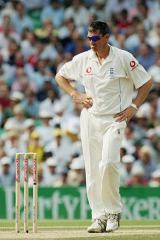
|

He may not bamboozle the opposition but Ashley Giles has carved a niche for himself in the England team
© Getty Images
|
|
Back in the days when England were an average side coming good at last, Nasser Hussain used to complain long and loud about the lack of 'mystery' in his bowling attack. England could hang in there with the best of them, was Nasser's reasoning, but no-one should expect them to get all flashy and start grabbing games by the scruff of the neck. They simply didn't have the touch of genius that is needed for such behaviour.
It's ironic then, that the one man to whom Hussain might have been referring each time he made that speech, is now an integral part of a team that has won six series on the bounce, and pulled countless lost causes back from the brink. Ashley Giles is one of the least mysterious cricketers ever to have walked the earth. His entire career has been spent
bearing unfair comparison to men that he is not - Shane Warne, Harbhajan Singh and Muttiah Muralitharan among them - and yet, here he is, back in Pakistan as one of the veterans of the team, with a half-century of Test caps under his belt, and an Ashes-winner's medal round his neck.
"I'm one of only two who have played here before, so I guess that makes me a veteran," he concedes reluctantly. Giles has faced too many brickbats in his time at the top to bother with big statements of intent, and the words "tempting" and "fate" are never far from his lips when asked to assess his prospects for the winter. "I had a pretty good time of it last time," is as much as he will admit. "They hadn't seen a lot of me, which helped, and we played on some pretty good pitches."
In fact, Giles had a very good time of it. He reaped 17 wickets on that last tour, a record for an England spinner in Pakistan. "It was a nice way to get my foot in the door," he says with trademark modesty, but he was more than just a gatecrasher to that particular party. Among his scalps was arguably the single most significant wicket of Hussain's tenure as captain.
Giles's spitting cobra to Inzamam-ul-Haq, eight minutes before stumps on the fourth day of the Karachi Test in December 2000, was the breakthrough that made possible the stunning events of the following evening, as Graham Thorpe and Hussain himself secured England's series victory as daylight ebbed away behind them.
For a man who protests that he is not Shane Warne, the Inzamam wicket was a pretty good imitation, as it gripped the leg-side rough and clipped the top of off. "It remains one of my favourite wickets," he admits. "Inzamam is a class player, particularly against spin, because he judges length very quickly off the front foot and back foot. And it was vital for the game as well, because having him out that night meant we had a sniff of winning
going into the last day."
There has been a sprinkling of such star-dust on Giles's career. His 100th wicket - Brian Lara, bowled through the gate en route to a nine-wicket haul at Lord's - was one such collector's item, while his ripper to Damien Martyn at Old Trafford this summer was an apt retort to Australia's taunts. "If any of our batsmen get out to Giles, they should go hang
themselves in shame," goaded Terry Alderman in the lengthy pre-series build-up. In the event, Giles's ten Ashes scalps included each and every member of the top eight.
But for the most part, Giles's role has been intensely mundane. In several of England's more comprehensive victories he has hardly bowled at all - particularly in those early-season Tests at Lord's - while his primary function is often to hold up an end while the seamers take a breather. It's not a glamorous remit, and he has been tempted on more than one occasion to save himself the hassle of constant self-justification. After a fruitless tour of the West Indies last year, he had to be coaxed back from the brink of retirement, and following England's first-Test defeat at Lord's last summer, he used his newspaper column to hit back at the critics who'd been carping about his role.

|

Ashley Giles's dogged batting is comparable to his bowling: no frills but very valuable
© Getty Images
|
|
One of the most vitriolic of these was Derbyshire's coach, David Houghton. "What use is [Giles] in the side?" he demanded. "With him, England are effectively playing 10 against 11." Giles responded with a sarcastic text-message that Michael Atherton described as "precious", before telling his Guardian readership that he felt he was "pissing against the wind." At the time it seemed like an ill-judged reaction, one that the Australians would doubtless seize upon as a weakness, but England's response - and Giles's own - at Edgbaston, revealed more about his standing in the side that had previously been imagined.
At the heart of the issue is Giles's position as the consummate team man. During the recent Super Series, while Australia were knocking the world's best players from pillar to post, The Guardian's Simon Hattenstone wrote an article singing the praises of the "plodder", those 110% effort-men without whom a side cannot function properly. The likes of Giles and Manchester United's Gary Neville, for instance, have to give their all in
every game they play in, because, let's face it, they can't afford not to. For the World XI to have competed properly, Hattenstone suggested, they needed more Gilos to glue the team together, and fewer Shoaib Akhtars. It was a convincing train of thought.
Nothing better exemplifies Giles's commitment to the cause than the development of his batting. During the Ashes, when the nerves were at their tightest on the final days at both Trent Bridge and The Oval, it was Giles who soothed the nation with his cathartic appearances at No. 8 in the order. On the first occasion he stroked the winning runs with three wickets to spare, on the second he batted and batted and batted, for a career-best 59, until the prospect of Australia levelling the series had been entirely dismissed.
Tailenders get the rough end of the deal, I suggest, because when it comes to the crunch, it's invariably their job to put their bodies on the line and save the day. "That's a bit harsh," he retorts, ever the team-man. "The batters get their fair share of runs as well. But my job is to bat and to bowl, and I'm trying to get better and better at both. Besides, it's great to be involved and moments like the winning runs at Trent Bridge, I wouldn't swap them for the world."
First and foremost, however, Giles is here as a bowler, and potentially, a series-winning one as well. Perhaps for the first time in his career, he has arrived in a country where he has a reputation to uphold, for the Pakistanis all remember and respect him for his deeds in 2000-01. But then, the team as a whole is in a similar position - any side who can
knock the Australians off their perch is sure to extract that extra incentive from their opponents.
"We're not trying to rise to the occasion or suffer from any extra pressure," says Giles. "We're just trying to be the team we've been over the summer, and we've just got to play the sort of cricket we did back then, positive hard cricket. It's not always going to go right, we not always going to win every game, but if we do the things right that we did
in the summer, then there's a good chance that we can win."
Forget the clamour for mystery bowlers. Giles has made a career, and helped build a great team, through the old-fashioned virtues of hard graft and honesty. There is no "I" in team, as he goes out of his way to demonstrate each time he takes the field.
Andrew Miller is UK editor of Cricinfo



